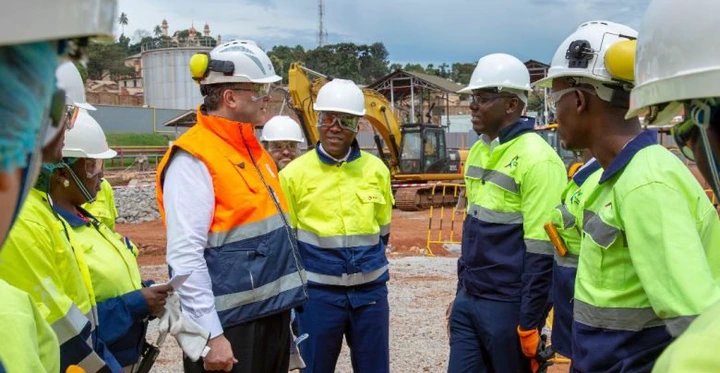TotalEnergies Sued in Uganda Over Failure to Pay Contractor Who Cleaned Up ‘Heavily Contaminated’ Fuel Depot in Kampala

Because Kampala’s aquifer system lies directly beneath the industrial area, the suit suggests the contaminants may have seeped further, potentially threatening the water table that serves millions of Kampala’s residents
French firm, TotalEnergies Marketing Uganda Ltd., is being sued in Uganda’s Commercial Court for allegedly refusing to pay a local engineering firm that says it cleaned up theFrench firm’s “heavily contaminated fuel depot” in the heart of Kampala.
The Commercial Court is expected to begin pre-trial hearings later this year, intensifying scrutiny of the multinational’s compliance with Uganda’s environmental protection laws.
The case, Civil Suit No. 264 of 2025 – Civtec Africa Limited vs TotalEnergies Marketing Uganda Limited, centres on the multinational’s 8th Street Depot in Kampala’s Industrial Area, where Civtec alleges that during demolition and excavation it encountered “extensive hydrocarbon contamination, including substantial deposits of oil, gas, and hazardous fumes within the underground pipes.”
Civtec says the contamination was so severe that it posed “grave environmental, health, and safety risks,” and that TotalEnergies “fraudulently concealed” this information before the project began.
The contractor argues that it was deprived of “critical information necessary for the safe execution of the works.”
Under Uganda’s National Environment Act, 2019, and regulations governing waste management, pollution control and drainage infrastructure, failure to disclose known hazards or secure prior environmental approvals can constitute a breach of statutory environmental obligations.
Asked to comment about the shocking development, Total Energies wrote to ChimpReports on October 14, 2025 (Ref: U.CA/10/453):
“Given that the matter is before court, we find that we cannot comment on it at the moment lest we prejudice the case.”
The company added: “However, at a later stage, we will be more than happy to answer all your questions.”
Kampala’s Water Table
According to the suit, Civtec discovered “flowing ground water and hydrocarbon products which had substantially contaminated the soil and the surrounding environment.”
The company says the contamination required excavation and disposal “in strict compliance with the National Environment (Waste Management) Regulations.”
The suit further states that during demolition Civtec encountered structural and environmental conditions that had not been disclosed at tender stage, including heavily polluted soil, underground water bodies and hazardous fumes.
Because Kampala’s aquifer system lies directly beneath the industrial area, the suit suggests the contaminants may have seeped further, potentially threatening the water table that serves millions of Kampala’s residents.
Civtec says TotalEnergies did not disclose the existence of this contamination in the bid documents or contract documentation, even though the 8th Street Depot had been under the company’s control for more than two decades.
The contaminated groundwater described in the suit may have posed a wider public risk.
Kampala, a city of almost five million people, relies heavily on underground aquifer systems for boreholes, wells and small community water sources, especially during interruptions in piped water supply.
Because the 8th Street Depot sits above these aquifer channels, the “flowing ground water and hydrocarbon products” discovered on-site could have allowed toxic petroleum residues to spread more widely.
If such pollutants seeped further into the water table, they could have increased cancer risks, caused respiratory complications, and strained Kampala’s already vulnerable water infrastructure.
Undisclosed Hazards
The company says it lost 48 working days awaiting instructions after discovering the unforeseen water bodies.
It argues that TotalEnergies was fully aware of these conditions but “fraudulently withheld this critical information,” exposing Civtec to environmental, operational and financial risks.
Civtec also claims the company issued additional instructions mid-project, including the relocation of an electrical powerhouse, without fully compensating the contractor for the expanded scope of work.
The lawsuit states that on April 12, 2019, Kampala Capital City Authority intervened after TotalEnergies allegedly failed to obtain necessary approvals for works on drainage infrastructure connecting to KCCA’s system, an issue Civtec says caused further delays and additional costs.
Compensation
Despite approving the disposal of contaminated soil, Civtec says TotalEnergies did not formally document or honour payments until a contract addendum dated December 5, 2019—months after the work was carried out.
The suit states: “Whereas this affected the costing of the contract, the Total Energies did not compensate Civtec for these works.”
TotalEnergies has previously faced sustained criticism from environmental groups and human-rights organisations over what activists describe as inadequate safeguards in its global operations, particularly in Africa.
The company has been the subject of lawsuits in France and elsewhere alleging failures to prevent environmental harm, risks to local communities, and insufficient oversight of contractors on large-scale projects.
Civtec’s lawsuit in Uganda arguably reflects recurring concerns about the company’s transparency, legacy contamination management, and compliance with national environmental regulations, issues TotalEnergies has consistently defended by citing its adherence to international standards and ongoing investment in environmental risk-mitigation measures.



0 Comments